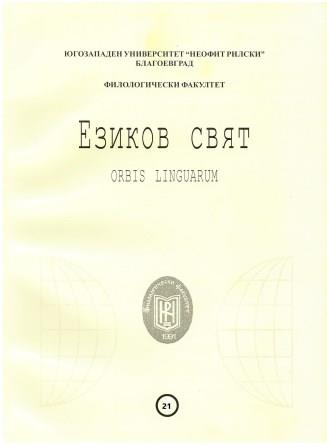МИФОНИМЫ КАК ЭТАЛОНЫ УРОДСТВА И КРАСОТЫ
THE MYTHONYMS AS THE STANDARDS OF UGLINESS AND BEAUTY
Author(s): Zifa Kakbaevna Temirgazina, Ol'ga AndryushchenkoSubject(s): Language and Literature Studies, Applied Linguistics, Philology, Stylistics
Published by: ЮГОЗАПАДЕН УНИВЕРСИТЕТ »НЕОФИТ РИЛСКИ«
Keywords: mythonym; mythological character; standard; beauty; ugliness; comparative construction; metaphor
Summary/Abstract: The article solves the problem of the functioning of mythonyms as the standards of a beautiful and ugly person in the Russian linguistic world picture. It has been established that the characters of lower mythology are chosen as the standards of ugliness, since, according to the pagan views of the ancient Slavs, they have innate physical disabilities: lameness, hunchback, hairiness, horns, tail, etc. The names “death” and “mortal sin” denoting personified anthropomorphic creatures are used as generally accepted standards of ugliness in the Russian language. Mortal sin is a generalized, undifferentiated image of ugliness, while death has specific external signs: it is a bony, wrinkled, toothless old woman. Some names of demonic characters (devil, demon, brat) are used as standards of beauty, expressing the idea of demonic beauty as opposed to divine one. Religious characters (god, angel, archangel, prophet) act as a standard of beauty, transmitting, among other things, the visual impressions of native speakers of the Russian language and culture, obtained from pictorial sources, the iconography. The functioning of mythonyms as standards of beauty or ugliness is based on the binary opposition “friend — foe”. Mythonyms-standards are marked according to the principle of gender correspondence of the sex of the object of comparison to the sex of the standard. Some mythonyms are gender neutral (angel, devil, demon). The functioning of mythonyms as the standards of ugliness / beauty is associated with the "vitality" of mythological thinking in the minds of native speakers of language and culture.
Journal: Езиков свят - Orbis Linguarum
- Issue Year: 21/2023
- Issue No: 1
- Page Range: 072-084
- Page Count: 13
- Language: Russian

